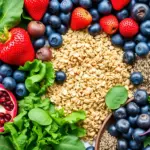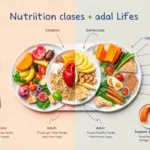Are you aware of the significant health risks associated with excessive sugar consumption? High sugar intake is linked to obesity, diabetes, and heart disease, making it crucial to assess your dietary habits. Reducing sugar intake not only helps combat these health issues but also promotes overall well-being and vitality. In this article, we will share 10 effective tips to help you lower your sugar consumption, leading to a healthier lifestyle and improved quality of life.
Understand Your Sugar Sources
Read Nutrition Labels
Learning to decode food labels is crucial for identifying hidden sugars. Nutrition labels typically list sugars under various names, which can make it challenging to spot them. Look for terms such as glucose, fructose, and sucrose, which are all forms of sugar. By familiarizing yourself with these labels, you can make more informed choices about the foods you consume.
Identify Common Culprits
Recognizing the foods and beverages high in sugar is a key step in reducing your intake. Common culprits include soda, candies, and packaged snacks, which can often contain large amounts of added sugars. For instance, a single can of soda can have around 39 grams of sugar, contributing significantly to your daily intake. Being aware of these products can help you make healthier choices and reduce your overall sugar consumption.
Make Substitutions
Choose Whole Fruits Over Juices
Opting for whole fruits instead of fruit juices can significantly reduce your sugar intake. Whole fruits contain fiber, vitamins, and minerals, which are often lost in the juicing process. For example, an orange provides natural sweetness along with fiber, which helps to slow down sugar absorption. Instead of drinking orange juice, snack on an orange for a healthier choice.
Select Unsweetened Products
When shopping for yogurt or milk alternatives, always look for unsweetened versions. Many products are packed with added sugars that can easily increase your daily intake without you realizing it. For instance, unsweetened almond milk or plain Greek yogurt can be excellent options. You can enhance their flavor naturally by adding fresh fruit or a drizzle of honey.
Limit Sugary Beverages:
Cut Back on Soda and Energy Drinks
Reducing or eliminating sugary beverages like soda and energy drinks can significantly decrease your daily sugar intake. These drinks are often packed with added sugars and provide little to no nutritional value. Instead, opt for healthier alternatives such as water, herbal teas, or sparkling water. These options will keep you hydrated without contributing to excess calorie consumption.
Be Mindful of Smoothies
While smoothies can be a healthy option, many pre-packaged versions contain added sugars that can spike your daily intake. To maintain control over what you consume, prepare smoothies at home. Use whole fruits, vegetables, and unsweetened yogurt or milk alternatives to create delicious drinks without any added sugars. This not only makes your smoothie healthier but also allows you to experiment with various ingredients to suit your taste.
Modify Your Cooking and Baking
Reduce Sugar in Recipes
One effective way to lower your sugar intake is to reduce the amount of sugar used in recipes. Many recipes call for more sugar than necessary, and often the flavor remains intact with less. Start by cutting the sugar by one-third to one-half, especially in baked goods. You may find that the dish is still delicious and satisfying without all the added sweetness.
Experiment with Natural Sweeteners
If you still crave sweetness, consider experimenting with natural sweeteners. Options like stevia, honey, or maple syrup can be used in moderation as alternative sweeteners. Keep in mind that these can vary in sweetness, so you may need to adjust the quantity based on your taste preference. To avoid excess sugar, always measure carefully and choose high-quality natural sweeteners.
Snack Smart
Opt for Healthy Snacks
Replace candy and cookies with healthier options such as nuts, fresh fruits, or yogurt. These snacks provide essential nutrients and keep you satisfied without the excess sugar.
Prepare Snacks in Advance
Keep healthy snacks readily available by preparing them in advance. Portion out nuts, chop vegetables, or pack yogurt in containers to reduce the temptation of reaching for sugary snacks when hunger strikes.
6. Increase Your Fiber Intake:
- Incorporate More Whole Grains: Choose whole grains like brown rice, quinoa, and whole-wheat bread to help regulate blood sugar levels and reduce cravings. Whole grains contain more fiber that aids digestion and keeps you full longer.
- Eat More Vegetables: Fill half your plate with a variety of colorful vegetables at every meal. Vegetables are low in calories and high in fiber, helping to promote fullness and diminish the desire for sugary snacks.
Educate Yourself on Added Sugars:
Learn Different Names for Sugar:
Familiarize yourself with the various forms of sugar found in food products. These can include sucrose, high fructose corn syrup, glucose, fructose, and agave nectar. Understanding these terms can help you identify added sugars more effectively when reading nutrition labels.
Stay Informed on Guidelines:
Keep track of dietary recommendations regarding added sugar limits. The American Heart Association advises that women limit added sugar intake to no more than 6 teaspoons per day and men to no more than 9 teaspoons. Staying informed about these guidelines can motivate you to make better dietary choices.
In this article, we explored 10 effective tips to reduce sugar intake in your diet, from understanding sources of sugar to making smarter snack choices. By learning to read nutrition labels, swapping sugary beverages for healthier options, and modifying your cooking habits, you can take meaningful steps toward improved health and well-being. We encourage you to gradually incorporate these tips into your daily routines, as small changes can lead to significant improvements in your overall health. For more insights and to stay updated on healthy eating habits, subscribe to our newsletter. We invite you to share your thoughts or any questions you may have in the comments below. Additionally, check out our related articles for more guidance on maintaining a healthy lifestyle!









